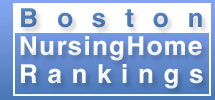Methodology Overview
The rankings on BostonNursingHomeRankings.com are derived from analyzing important data about nursing homes, including recent public data from the Massachusetts Department of Public Health and from Medicare. While the data provided on this site is informative, please remember that reviewing this information is but one step in the process of choosing a nursing home.
There are 456 Medicare/Medicaid certified nursing homes in the state of Massachusetts. This website has comprehensive data on 120+ (and counting!) of these nursing homes in the Greater Boston Area. Nursing Homes are defined as facilities that provide short-term rehabilitation, long-term convalescent care, or both services. Since there is some variation (e.g., facilities that provide short-term rehab only), this information has been included on this site.
Since most people shop for nursing homes on a local level, each facility is compared to other facilities within the same "area" only. For example, all facilities within the "Boston Metro" area (see below) receive a ranking for the "Boston Metro" area only.
Sample
Boston
Metro: Boston, Brighton, Brookline, Cambridge, Dorchester, Jamaica Plain and
Somerville
MetroWest:
Framingham, Lincoln, Medfield, Natick, Needham, Newton,
Sudbury, Waltham, Watertown, Wayland, Wellesley, Weston
North Shore:
Beverly, Chelsea, Danvers, Everett, Lynn, Malden, Marblehead, Melrose, Nahant, Peabody,
Revere, Salem, Saugus, Swampscott, Wakefield, Winthrop
South Shore:
Braintree, Brockton, Canton, Cohasset, Dedham, Duxbury, Hingham, Kingston, Milton, Norwell,
Norwood, Plymouth, Quincy, Randolph, Rockland, Scituate, Stoughton, Westwood, Weymouth
NorthWest:
Andover, Arlington, Belmont, Lexington, Medford, North Andover, North Reading, Reading,
Stoneham, Wilmington, Winchester, Woburn
Please note: a very small number of nursing homes may not be included in our rankings due to unavailability of survey data.
Ranking Criteria
Department of Public Health
Score
DPH
The surveyors assign performance scores within five key areas (Administration, Nursing, Resident Rights, Kitchen/Food Service and Environment). The total maximum score possible is 132 points – this means that the facility is in 100% compliance with all regulations. Scores reflect performance over the last three years. The Statewide average score in Massachusetts is 123 points and the lowest score received by facilities on BostonNursingHomeRankings.com is 100. For more information on survey methodology, go to: http://www.mass.gov/dph/qtool/qthome.htm.
The DPH score is given significant weight because it’s considered very reliable and comprehensive and doesn't simply involve self-reported data. However, it’s important to evaluate additional quality factors for a more complete profile of each facility.
Bonus
Quality Score
BostonNursingHomeRankings.com analyzed other important
factors that impact quality: staffing hours for Certified
Nursing Assistants (CNA) and Licensed Nurses; type of
ownership information; and complaints made about
the facility.
The factors that contribute to the Bonus Quality Score are assigned a “weight” that reflects how important that indicator is based on our judgment, which is informed by both personal experience and research findings.
Facilities are compared to one another and given points relative to their performance in the specific category (i.e., staffing hours, type of ownership and complaints). The maximum number of bonus points available for each facility is 100.
Please Note: the CNA and Nursing hour averages for facilities that offer only short-term rehab/nursing are quite different from those that offer both short and long-term care. Therefore, short-term facility staffing values were considered independent of those that provide both short and long-term care.
Below you can read more about the specific categories that comprise the "Bonus Quality Score." Also, some of the research supporting the importance of each factor is noted.
CNA
Hours & Licensed Nursing Hours
Research indicates that staffing levels
impact quality of care.
For example: "The preponderance
of evidence, from a number of studies, using different types
of quality measures, shows a positive relationship between
nursing staff levels and quality of nursing home care."
Source: Institute of Medicine, Division of Health Care
Services, 1996
Another example: “Our findings to date show a strong association between staffing levels and quality care. This is the first time ever that a clear relationship between staffing levels and quality of care has been demonstrated in a statistically valid way, and marks a major step forward in understanding that relationship.” Nancy-Ann DeParle, U.S. Dep’t of Health and Human Services, Testimony on Nursing Home Staffing Before Senate Committee on Aging, 2000.
The Gerontological Society of America published research which found that higher staffing levels were associated with fewer lawsuits against nursing homes. Click here to read full article.
Type
of Ownership
Research indicates that, on average,
non-profit facilities provide better care and higher levels
of staffing than for-profit/investor owned facilities
(American Journal of Public Health, 2001).
“Not-for-profit
nursing homes are more likely to provide good care than
for-profits, based on our analysis of inspection surveys,
staffing, and quality indicators.”
Consumer Reports, Nursing Home Guide 2006.
Chain
vs. Single Facility
Some facilities
are independently owned. Others are part of a
"chain," meaning that the facility has
two or more homes under ownership or operation. Based
on their detailed and thorough analysis of inspection
surveys, staffing, and quality indicators, Consumer Reports
concluded that “independently run homes are more likely to
provide good care than chains.” Consumer Reports, Nursing
Home Guide 2006.
Complaints
A "Yes" value means that the facility was cited for a
deficiency related to a complaint/serious incident,
according to the Dep't of Public Health. Note: many facilities may receive
complaints/allegations of serious incidents, but
facilities are only cited (given a “yes” value) if an
investigation determines actual wrong-doing (e.g.,
investigation of allegation found that abuse or negligence
occurred). If
a facility did not receive serious complaints or the
investigation found the complaint invalid, then a “no”
value is given. Facilities lose bonus points if they
have received valid complaints.
Visit our glossary, for more information about terms used on BostonNursingHomeRankings.com.
Please email us at info@bostonnursinghomerankings.com if you have questions about our information or if you find any data errors.
